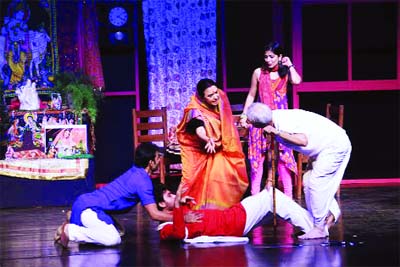Renowned folk singer and veteran actor Ila Arun’s play Namastey which made its debut in the Capital recently, talked about resolving the conflict of the old and the new by resorting to dialogues.
Set in a backdrop of Krishna Janamashtmi, the play revolves around Delhi’s suburban house where a couple — Shanti (Ila Arun) lives with her retired husband Nand Kishore (KK Raina) and a differently-able son Sohan. A hindi adaptation of Tom Dudzick’s English play Greetings!, Namastey was directed by actor KK Raina and moulded in an Indian context by the folk veteran.
“Rainaji reads a lot and I’m a prolific writer. He came up with this idea and gave me the responsibility of Indianising it. Greetings is set around Christmas eve. The idea of Janamashtmi came to mind and once I placed the Krishna’s jhanki, everything else fell in the place,” Arun tells us about the inception of the play which was staged in Kamani Auditorium for MTS India’s women customers in alliance with FICCI ladies organisation.
Embezzled with political witticism, the play is enlaced in day-to-day repartee and yet was very thought provoking. “The play has all the elements that will engage with the young as well as the older audiences. We should always look forward to protect our culture and tradition while striking a balance with the modern thoughts,” she says.
Namastey revolves around frivolous clashes between the father and his America-returned son Mohan who wants to marry an atheist girl. The firm believer father is reluctant to accept a non-believer. The twist comes when a miraculous festival eve changes their way of thinking. The disparity in their views is evident which is presented in a comic act.
Talking about the generation gap that the play deals with, Arun says it does exist: “I’m sure none of the teenagers would’ve been interested in seeing this play. They just don’t know what we are talking about. We want to create a platform where we can exchange dialogues with this generation. If you don’t follow your roots, the person will be very hollow. It’s essential to pay heed to all perspectives and then decide what to do. We should strive towards happiness which will need a mix of both experience and modernity,” the actress says.
Arun, who was originally a theatre artist from Jaipur says her contribution to music is only the reflection of what she learnt on the stage. “Theatre is my first love and I’ll continue to do a lot of theatre. I want to express myself through various mediums. It’s not essential to join politics if you want to bring about a change in the society,” she says.
Though the current status of folk art and theatre is deplorable, she has a ray of hope that there will be revival. “There was a time when we thought theatre is almost dead, but now is the time for revival. We’ve something in our culture that has always attracted people from the West. India has a lot to offer,” she asserts.
The music industry has also evolved over a period of time. With the advent of rap and spicy Bollywood numbers, the folk industry is on a setback. “If you present indigenous music sugar coated with the Bollywood spice it will immediately strike a chord. Time has changed and we must keep pace with the changing times,” Arun, who has adapted 10 plays from various languages, says. She explains that it’s a tough job to take a play based in a different culture and set it in the local context. “The metaphor, stage and the context needs reworking,” she explains. Her next play will be staged in Kashmir by the end of this year.


























